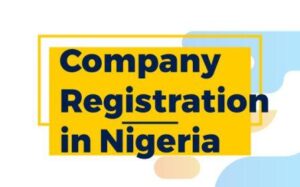Welcome to Evunn Startups Business formation group, your trusted partner for seamless company registration in Nigeria.
Thank you for reading this post, don't forget to subscribe!Our legal team helps to make easy the process of establishing your business, ensuring compliance with regulatory requirements and empowering your entrepreneurial journey.
Let us guide you through every step, from entity selection to documentation, making your dream of company ownership a reality in Nigeria’s dynamic business landscape.

A registered business enhances credibility and trust among customers, suppliers, and potential partners.
It demonstrates your commitment to professionalism and compliance with legal regulations.
Company Registration
One Million Shares-
One million shares company registration
-
Company registration certificate and other company registration documents
-
Drafting of all incorporation documents
-
1-2 weeks delivery time
-
Free advice on business entity selection
-
Unlimited directors/shareholders
Business Name Registration
What You Get-
Business name registration certificate and other company registration documents
-
1-2 weeks delivery time
-
Free advice on business entity selection
-
Upto 20 partners
NGO REGISTRATION
What you Get-
Incorporated trustees registration certificate
-
Drafting of the constitution
-
Drafting of all registration documents and minutes of meeting
-
45-60 business days delivery
-
Free advice on association name selection
Custom
Want to register a specialized company like finance, banking, banking, insurance, maritime, group of companies, companies with foreigners etc? Contact us below.
What you Get
- From 2 million share capital
- Drafting of all incorporation documents
- Unlimited directors/shareholders
- TIN certificate
- SCUML certificate
Annual Returns Filing
Filing annual returns ensures that your business is not delisted or made inactive by the CAC. How much you pay for annual returns depends on whether you business is registered as a company, business name or incorporated trustee. Trust me the amount is usually small and you pay only once a year. To find out how much you need to pay, contact us below.

Trademark Registration

Registering a trademark provides legal protection for your brand name, logo, slogan, or any other distinctive sign associated with your products or services.
It gives you exclusive rights to use the mark in connection with your business and prevents others from using it without your permission. When you decide to sell your business, your trademark becomes an asset increasing the value of your business.
Trademark Registration Stage 1
What you Get-
Registration acceptance
-
6 weeks delivery time
-
Free advice
Trademark Registration Stage 2
What you Get-
Registration Certificate
-
60 business days delivery
-
Free advice
FAQs
Limited Company (Ltd) is a popular choice for startups due to its flexibility, limited liability protection, and potential for raising funds through investors or venture capital. In other words it’s more advisable to start with registering a limited liability company as against registering a business name, but if you are short of cash, you can go for business name registration and upgrade to limited liability company later.
Company registration VS Business registration.
Sole Proprietorship or business name registration is the simplest and most cost-effective option. However, the owner has unlimited personal liability for business debts and obligations which is a very huge disadvantage of registering a business name.
What this means is if you register a company and the business ends up in debt, the creditor is limited to the amount of money left in the business and cannot collect his money from the personal assets of the owners of the business.
However, if it where to be a business name registration, the creditor will collect his money from whatever is left in the business and still go ahead to collect from the personal assets of the founders of the business until his money is complete.
There are a lot of other benefits registering a company has over registering a business name.
Requirements for company registration in Nigeria:
- 3 proposed names of the business
- 3 objectives of the business
- Registered address of the company
- Company’s email address
- Names of directors and shareholders
- Percentage of share allotment to the share holders
- Residential addresses of all directors and shareholders
- NIN or other valid means of Identification (government issued ID) for all shareholders and directors
- Phone numbers, emails addresses of all drectors and share holders
- Signature of each shareholder and director signened on white paper and scanned for upload
Filing annual returns is all about submitting certain documents and financial information to the Corporate Affairs Commission (CAC) in Nigeria, on an annual basis. This requirement applies to registered companies and entities and is mandatory.
It’s just like submitting a yearly report card to the government to show that your business is still alive or active.
An annual return is not a declaration of the profit earned by your company in a year, nor is it a financial statement. Instead, it serves as a yearly update provided by an active registered business name or company to keep the Corporate Affairs Commission (CAC) informed about the entity’s activities, structure, and financial status.
A lot of small business owners are afraid of potential heavy taxation if they regularly file returns with the CAC.
However, this notion is inaccurate.
The cost of filing annual returns is relatively low and you pay pay thie same amount once every year.
It’s essential to understand that filing annual returns is distinct from tax payments.
Filing annual returns is essential for maintaining the company’s legal status and compliance with regulatory requirements. Failure to file annual returns within the specified timeframe may result in penalties, fines, or even deregistration of the company. It also provides transparency and accountability to shareholders, investors, and other stakeholders regarding the company’s financial health and performance.
Deadline for filing annual returns in Nigeria:
Annual returns payment should be made on or before June 31 every year.
Failure to do so, attracts payment of default fees and if you still fail to pay, after some years, your business will become inactive or delisted in the CAC portal
Registering a trademark offers several key advantages:
1. Legal Protection: Registering a trademark provides legal protection for your brand name, logo, slogan, or any other distinctive sign associated with your products or services. It gives you exclusive rights to use the mark in connection with your business and prevents others from using it without your permission.
2. Brand Recognition: A registered trademark helps build brand recognition and distinguishes your products or services from competitors in the marketplace. It establishes a unique identity for your business, making it easier for consumers to identify and remember your brand.
3. Preventing Brand Confusion: Registering a trademark helps prevent brand confusion and protects consumers from being misled or deceived by similar or counterfeit products. It gives consumers confidence in the authenticity and quality of your brand.
4. Market Expansion: A registered trademark can facilitate market expansion by allowing you to use the mark in different geographic regions and product categories. It provides a solid foundation for building brand loyalty and expanding your business into new markets.
5. Legal Recourse: With a registered trademark, you have legal recourse against infringers who use your mark without authorization. You can take legal action to enforce your rights, stop unauthorized use, and seek damages for any harm caused to your business.
6. Asset Value: A registered trademark is a valuable business asset that can increase the overall value of your company. It enhances your brand’s reputation, goodwill, and marketability, making your business more attractive to investors, buyers, and partners.
7. Global Protection: In an increasingly globalized marketplace, registering a trademark can provide protection for your brand internationally. By securing trademark rights in multiple countries, you can safeguard your brand against infringement and unauthorized use on a global scale.
Trademark registration in Nigeria has stage one and stage two. Most people usually go for stage one and stop there without going through with the final stage of registering their trademark mostly because of cost. Here is a breakdown of the two stages.
1. Application Stage: This is the initial stage where the trademark application is filed with the ministry of trade and investment. During this stage, the application undergoes an examination process to ensure it meets the necessary legal requirements for registration, such as distinctiveness and non-conflict with existing trademarks.
What you get after concluding with this stage is called acceptance. It means your trademark has been registered, but not fully concluded.
2. Publication Stage: After the application is examined and found to meet the requirements, it is typically published in an official gazette or journal to allow for opposition from third parties who believe they may be harmed by the registration of the mark. This is often considered a crucial stage in the registration process.
3. Collection of trademark registration certificate: Once any opposition period has passed without any opposition or after successfully overcoming any opposition, the trademark is FULLY registered. At this stage, the trademark owner is granted exclusive rights to use the mark in connection with the specified goods or services.
4. Renewal Stage: Trademarks usually require periodic renewal to maintain their registration. This stage involves submitting renewal applications and paying renewal fees at specified intervals.
if you are short of cash, you can go for stage one and do stage 2 later.
NOTE: If someone else registers the same mark as you did and goes ahead to conclude to stage 2, the person is deemed to be the owner of the mark as he/she bears the certificate for that trademark

